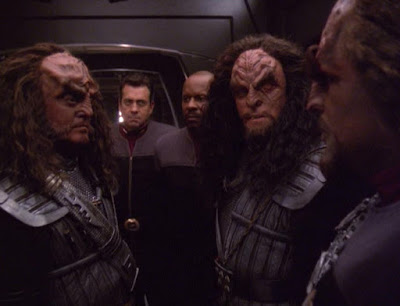 |
| Sloan lays one last trap for Dr. Bashir - inside his own mind! |
THE PLOT
Odo is dying.
The Changeling virus created by Section 31 has advanced to a terminal stage, and he now has just 1 - 2 weeks to live. Dr. Bashir can make him comfortable, but cannot save him. He does have one idea, however - To lure a Section 31 operative to the station by sending a fake message to Starfleet Medical indicating that he's discovered a cure.
The bait is taken, and the trap sprung on - who else? - Sloan (William Sadler). Bashir traps the agent in a force field... But before he can interrogate Sloan, the man activates a suicide capsule. The doctor is able to temporarily stabilize him, but Sloan is already too far gone to reawaken.
Which leaves just one option to find the information he needs. He and O'Brien use Techno (Medo?)-babble devices to travel into Sloan's subconscious mind, entering the dying man's dreamscape to learn how to cure their friend before it's too late!
CHARACTERS
Capt. Sisko: When Bashir and O'Brien inform him of their plan, he indicates it's a "pretty long shot," but does not shut it down. Even when he discovers Bashir and O'Brien invading Sloan's mind, he does not stop them; and when they finally come to, just as Sloan dies, he doesn't spare a second for the late, unlamented agent. He just asks if they located the cure... Another example of how much more ruthless and goal-oriented the Sisko of recent episodes has become.
Bashir/O'Brien: The interactions between Bashir and O'Brien help to keep us invested in their disappointingly pedestrian trip down the rabbit hole. The first thing they encounter upon entering Sloan's subconscious is... the DS9 turbolift. They cling to the rails as if for dear life, each goading the other to let go first before finally agreeing to do so together. A later scene has them talking about their friendship vs. their respective romantic relationships. Bashir confesses that he is passionately in love with Ezri, but that he likes O'Brien "a bit more." O'Brien amusingly (unconvincingly) denies the same with regard to Keiko vs. Bashir. It's a funny, genuine moment.
Odo: Gets a standout scene at the start, when he pushes Kira to go back to Damar. He insists that she has to go, and tells her flatly that he wants her to leave. "You watched Bareil die in this very room, and I know how that's haunted you. I don't want your last memory of me to be witnessing my death." Rene Auberjonois and Nana Visitor are terrific, providing an emotional resonance lacking in the rest of the piece.
Sloan: There is one scene that indicates Sloan might have been used to provide that resonance. When Bashir and O'Brien enter his mind, they are almost immediately greeted by the dying man - But a much more open and affable version of him, who desperately wants them to witness his apology to his friends and loved ones. The scene underscores that people like Sloan usually go into their line of work with patriotism and good intentions. That this more human version ends up being assassinated by Section 31 Sloan is a rather obvious bit of symbolism, but it's not ineffective. If only the episode had devoted a little more time to the idea of a good man corrupted by his own work, rather than dodging into a weak Third Act fakeout that wouldn't fool a small child.
THOUGHTS
Just to get this out of the way up front: Extreme Measures is fine, as far as it goes. It does its job in advancing the overall story, while at the same time working as an episode in its own right. And, of course, any Bashir/O'Brien episode benefits from the wonderful screen cameraderie between Alexander Siddig and Colm Meaney.
So it should be understood that I'm not really bashing this episode. I'd probably be fairly positive about it had it popped up in the midst of the mid-season filler. But amongst the strong run of shows wrapping up the series, it feels decidedly lacking by comparison.
A fair comparison can be made to Season Three's Distant Voices, another episode that trapped Bashir inside a station-bound dreamscape. Though that was far from my favorite episode, lacking narrative momentum, it did a much better job of creating a dreamlike atmosphere on the standing sets than this one, not to mention offering some memorable set pieces. This episode achieves neither of those. Steve Posey's direction is competent but bland, and writers Bradley Thompson and David Weddle spend half the running time setting up the journey into Sloan's mind, thus leaving only about twenty minutes for Bashir and O'Brien to explore that setting.
There's a Third Act fakeout in which we're meant to think O'Brien and Bashir are back in the real world, only for them to discover they are still in Sloan's mind. The problem is, it's so clearly telegraphed that I can't imagine anyone being fooled. It just provides a complication, something to delay our heroes from the final confrontation with Sloan.
Overall, the episode is serviceable and does what it needs to do, and I wasn't bored by it. But I also wasn't particularly hooked. Given the quality of most of this final run, I can't help but label this a disappointment.
Overall Rating: 5/10.
Previous Episode: Tacking into the Wind
Next Episode: The Dogs of War
Search Amazon.com for Star Trek: Deep Space 9
Review Index
To receive new review updates, follow me:
On BlueSky:
On Threads:










